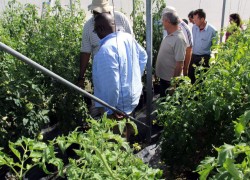
The government and the College of the Bahamas (COB are taking steps to establish a school of agriculture in North Andros.
Situated on the site of the former agriculture research centre in San Andros, the project seeks to train Bahamians to take advantage of a nearly $1 billion industry.
Seven Cuban technicians with various specialties, including rice and coffee production have been engaged to assist in the operation.
Bahamas Agriculture and Industrial Corporation (BAIC) Chairman Arnold Forbes and a high level team toured the proposed site on Wednesday.
Included were General Manager Benjamin Rahming, Assistant General Manager (agriculture) Arnold Dorsett, Assistant General Manager (land) Judith Thompson, Agriculture Consultant Godfrey Eneas, and College of the Bahamas (COB) University Transition Secretariat team leader Dr. Olivia Saunders.
They were received by North Andros and the Berry Islands administrator, Ivan Ferguson, BAIC investments manager, Alphonso Smith, and other local officials.
“Andros has the potential to be the breadbasket of The Bahamas,” said Mr. Forbes. “Until we take Andros and agriculture seriously we will continue to spend hundreds of millions of dollars on food imports.
“Food security is key to the survival of any country. Without food security we are not reaching proper nationhood status because a nation should be able to feed itself. Until we are on that road we have a lot of work to do.”
Late last year, The Bahamas sent a trade mission to Cuba.
Meetings were held with Cuba’s Ministry of Agriculture.
“They graciously allowed their professionals to come to The Bahamas to give us advice on what it will take to get The Bahamas on the road to food security,” said Mr. Forbes.
“We are looking at an exchange of ideas and techniques and formulas so that The Bahamas agricultural product can catch up with the rest of the world.
“We are spending about $700,000 on food imports every year. If we can dent that by 25 per cent, we are saving almost $200 million that can stay in our country and make our economy stronger.”
There is no guarantee as to the quality of food imports, said Mr. Forbes.
“When we import food we are not importing the highest quality food,” he said. “In most cases we are getting a second class product. We wonder why we are having so many illnesses as well. Do we know what we are importing? We are actually entrusting our health to someone else when we import food.”
“But, if we are growing our own food and we are doing it in a way that is sustainable, pesticide free and organic we know what we are putting into our bodies and I guarantee
you we will see a healthier population as a result.”
For agriculture consultant, Mr. Eneas, the near $1 billion in imports each year to feed residents and tourists is already “unsustainable.”
“We are exporting jobs,” he said. “Many of the crops we import, many of the processed food we eat; we can do it here. And it is by creating value added in food processing that you create jobs.
“We cannot continue to depend on others to produce our food. By producing food locally we know it is nutritious, we know it is fresh and we know the conditions under which it is grown so it is in our interest to become more productive.”
With islands of Andros, Abaco and Grand Bahama having “untapped potential,” Mr. Eneas cited a variety of career opportunities from farming to processing to marketing.
“Agriculture can be the basis for the economic sustainability of many of our Family Island communities,” he said. “As a result of that people will not have to migrate to New Providence because we can create jobs within these communities.”
Mr. Eneas underscored the need for those engaged in agriculture to upgrade their skills incorporating science and technology.
“If we are going to be competitive, if we are to function as a WTO member, we have to upgrade our skills,” he said.
“We have to provide the infrastructure for globally competitive agricultural system. We lack infrastructure which is needed for our country to sign bilateral agreements to ensure that what is coming into our country is safe.”
He continue, “But, for too long we have depended on others not only to grow our food and feed us but also to ensure the safety of our environment an eco system. We as a country have to grab hold of our future.”
In her capacity as team leader of the College of The Bahamas University Transition Secretariat, Dr Saunders said the project is going to be an integral part of the proposed University of The Bahamas.
“A goal of the University is to drive national development and agriculture must play an extremely important role in development of the nation,” she said. “Food security is serious business and if the University is not able to incorporate this vision then I don’t think we would be doing our job properly.”
A current lack of interest among Bahamians in agriculture, she said, can be attributed to a lack of knowledge of the importance of agriculture and how the economy is structured.
“But I feel that many Bahamians are interested in broader national development and once they become more aware of the possibilities and potentials in agriculture, more will become interested,” said Dr Saunders. “Agriculture is a business and so business students will see opportunities in agriculture also.”
“Our job as we progress in this project is to broaden the base of knowledge of young people generally to understand that we can produce to feed ourselves, that we have a responsibility for our own food security, and that there are economic possibilities for them and the country.”



Agriculture is very important for the Bahamas and the resdents.Since they lact the technical skills required,they need to get that aspect on the list of priorities.The government needs to have some of that money spend on food import back in the economy.